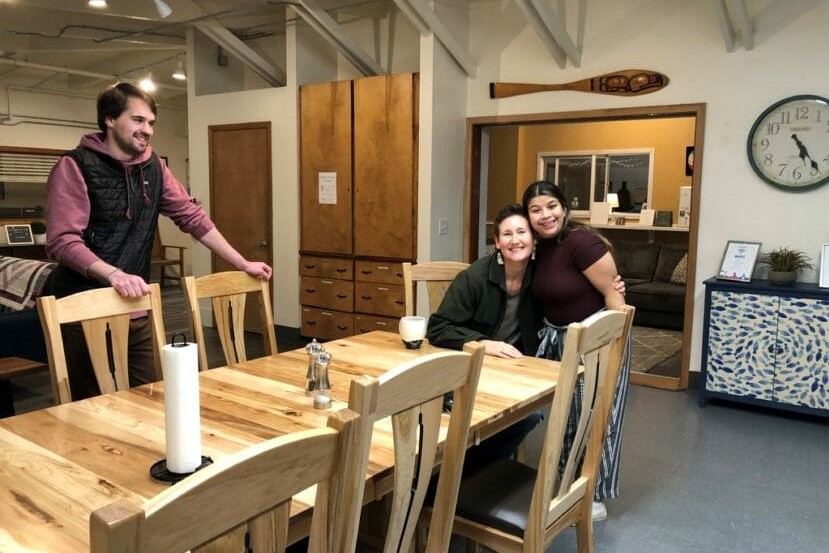
For two long years, there was no dedicated shelter for young people in Juneau who needed a safe place to sleep. But last July, Shéiyi X̱aat Hít, or Spruce Root House, opened. In partnership with Tlingit and Haida Regional Housing Authority, the city designed the shelter with input from youth who had direct experience with homelessness.
In the fifteen months since the shelter opened, Jorden Nigro says dozens of individuals have been helped. If you multiply the number of individuals by the number of nights spent at Shéiyi X̱aat Hít, it’s around 1,600.
Nigro is the youth services manager for Juneau Parks and Recreation, and she runs the Zach Gordon Youth Center and Shéiyi X̱aat Hít Youth Shelter.
“I’ve known kids who have traded, you know, sexual favors for places to stay, who have been exposed to things that they really should not have been exposed to, in order to have a place to stay,” Nigro said. “So yeah, there’s some real sad stuff that will happen when there aren’t places like this for kids to go.”
The kids use the shelter for a few different reasons, Nigro said.
“For the most part, our youth who are coming into the shelter have either run away from home or threatened to run away from home, or they are living at home in an unsafe situation,” she said. “And they come in because of abuse or neglect.”
The average time spent per youth at the shelter is about 13 days.
A large part of the role of the staff of Shéiyi X̱aat Hít is to work on family mediation, Nigro said. So far, more than 90% of the youth who have used the shelter have gone on to a safe and stable place.
“And we do these exit surveys when kids leave and ask them a bunch of questions, but one of the things is like, ‘Would you recommend this to a friend?’” she said. “And 100% of the youth have said ‘yes.’”
Before Shéiyi X̱aat Hít opened, Tiana struggled to find a safe place to stay, when her family home wasn’t safe. KTOO isn’t using her last name due to the stigma attached to homelessness.
She’s 19 now and has her own apartment. She joined the city’s Youth Action Board in 2020, where she has been sharing her ideas about what would help kids who are in situations similar to hers growing up.
The board meets weekly and is open to any youth who want to give input.
One thing that was important to her when designing the youth shelter was that each person should have their own room.
“Maybe if I was in this situation, which I was,” Tiana said. “I wouldn’t want to do that with somebody else, I would want to have the privacy of being able to be alone and sit in my room.”
Another project she pushed for on the Youth Action Board was a place for people aged 18 to 20. So the shelter also hosts transitional housing, a four-room apartment, which is currently rent-free.
Eleven people have used the apartment since the shelter opened. Usually, people stay there for about two or three months, says Nigro.
Shéiyi X̱aat Hít Youth Shelter is more than a place to stay for a while. Nigro said the staff work to foster community with youth by cooking and eating together, encouraging “normal” daily routines, and having downtime when youth can watch TV and play games together.
Nigro said about half of the youth at Shéiyi X̱aat Hít are LGBTQ+ identifying, and a quarter of them are transgender.
This is consistent with national trends: 28% of LGBTQ+ youth experience housing insecurity or homelessness. But having at least one supportive adult in their life decreases their chance of attempting suicide by 40%.
Tiana says that the adults at Shéiyi X̱aat Hít and Zach Gorden were a lifesaver for her, too.
“I know there’s a lot of kids out there who grew up, or is growing up right now that don’t have a safe place to go and don’t have people to turn to. And that was me,” Tiana said. “And these people are the people that I learned how to turn to, so being involved in this has changed my life for the better.”
Nigro says she wants more people to know about Shéiyi X̱aat Hít, so any youth who find themselves in an unstable housing situation know where they can go.
KTOOis our partner public media station in Juneau. Alaska Public Media collaborates with partners statewide to cover Alaska news.




